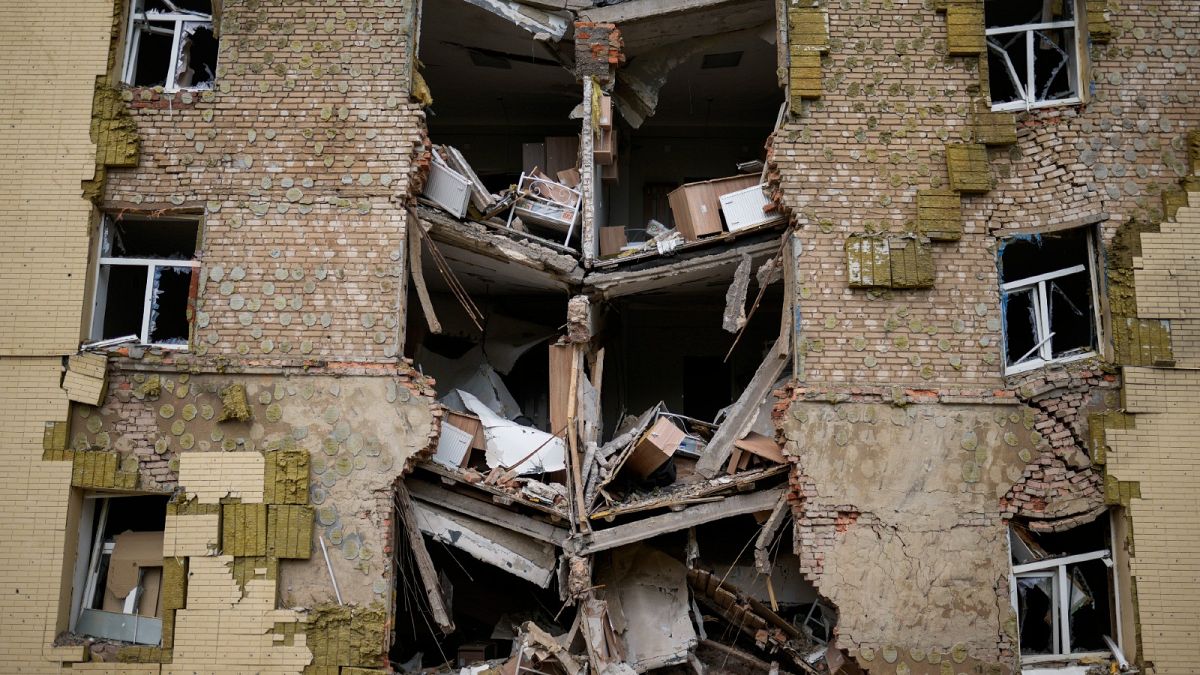"We know that our democracy is still a work in progress and that when peace comes we must be ready to get back to work."
I was in the town of Bucha, north of Kyiv, a few days ago, to talk with local officials about funding needs for ongoing reconstruction.
It was on a sunny, October day when the golden oaks and red maples seemed somehow to defy the atrocities committed there under Russian occupation and to point us towards renewal.
On Vokzalna Street, houses that were severely damaged in the first weeks of the war are now being rebuilt; the local supermarket, almost completely destroyed by a missile, has been rebuilt and is back in business since mid-September.
Work began almost as soon as the Russians retreated: now people who are back in their homes are bracing for the winter; there is a mixed sense of urgency and hope in the air.
This is just a fraction of the work underway in the towns and villages liberated from Russian occupation - some of it already being supported by our international allies.
Ahead of us lies the even greater challenge of the post-war reconstruction that will come with Russia’s inevitable defeat.
We need to prepare for that effort. But what kind of country will we be rebuilding?
Ukraine’s democracy has surprised the world with its resilience in the face of the full-scale war of aggression launched by Moscow in February. I am privileged to work with a vibrant array of people -- urban planners, community leaders, local businesses, advocacy groups, and others -- who have long fought to strengthen democratic freedoms and rights in Ukraine.
But we know that our democracy is still a work in progress and that when peace comes we must be ready to get back to work.
Yes, Ukraine will need billions of dollars of investment to create a restructured hopefully greener energy sector that will end our historic dependency on Russian oil and gas.
But how the decisions get made about how this money is spent, and on what, are questions that will have a huge impact on the parallel project of building a yet more resilient democracy in my country.
In the worst-case scenario, investment in reconstruction could serve to entrench the power of the old, by feeding the pre-war business oligarchy steeped in a culture of endemic political corruption that fuelled popular cynicism about politics and undermined Ukraine’s democratic development.
A wave of poorly managed funding could undermine the successful reforms undertaken since 2014 to decentralise government and strengthen local administrations, seen as a way to increase local participation and combat corruption.
The war has understandably put this process on ice, military administrations are now in control of war-affected regions, creating the obvious risk that the centre, not the regions, will be the primary political beneficiary when reconstruction comes.
So, as this vital effort gets underway, decisions need to be taken now to ensure that reconstruction moves Ukraine forwards, not backwards.
Notably, the government needs to establish a state institution and a public fund, that would lead the reconstruction and recovery processes that would be fully accountable and transparent, and whose priorities at a local and national level would be shaped by the widest possible participation.
The international donor community has a role to play here by ensuring that a range of Ukrainian voices and civil society groups -- as well as the voice of the national government -- participate in the main decision-making forums, including the 2023 Recovery and Reforms Conference in London.
Donors need to offer the needed support to Ukrainian civil society groups that enable them to continue to work to reinforce Ukraine’s democracy in the years to come.
Because in the future Ukraine will not only need bridges and power lines and roads and ports. If Moscow’s hideous war has shown us anything, it has shown what can happen in a society where all diverse and critical voices are silenced.
Conversely, Ukraine has drawn strength from its decentralised local government from civil society groups who are playing a vital role now in our broader war effort, even today as we prepare for the uncertainties of winter.
Today, these groups are supporting flexible access to education for millions of Ukrainian children affected by the war; providing training, employment and business opportunities for internally displaced people, fostering women’s leadership, giving agency to veterans, supporting the injured, promoting resilience and mental health, and empowering people with disabilities and elderly people dramatically affected by the war. Some 60% of all Ukrainians have engaged in this kind of civil society work or volunteered since February 2022.
This is the spirit that will guide Ukraine to a better future; it needs to be included in the great work of reconstruction that lies ahead.
Oleksandr Sushko is the executive director of the International Renaissance Foundation (IRF), which supports an active, diverse and open civil society in Ukraine.
